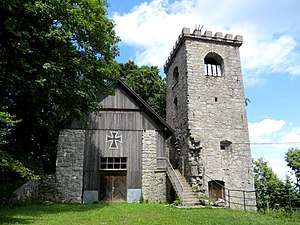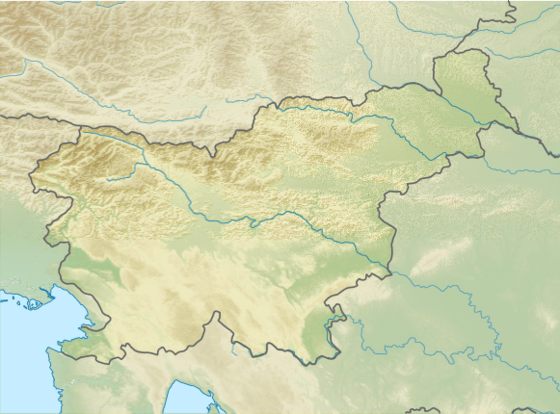Mount Mirna
Mount Mirna (Slovene: Mirna gora, German: Friedensberg, Friedbüchel),[1] literally ‘peaceful mountain’, is a mountain in the eastern part of Kočevje Rog.[2] It is located above the settlement of Planina and is the highest point in the traditional White Carniola region of Slovenia.[2]
| Mount Mirna | |
|---|---|
 Ruins of Saint Francis Xavier Church at the summit of Mount Mirna | |
| Highest point | |
| Elevation | 1,042.7 m (3,421 ft) |
| Coordinates | 45°37′56″N 15°5′39″E |
| Geography | |
 Mount Mirna | |
Name
The name of the mountain was attested as Fridt Püchl (literally, 'peace mountain') in 1754.[3] Traditional explanations of the name are connected with the function of the church that once stood there or the idea that it was spared from Ottoman attacks.[4] However, like other Slovenian toponyms that seem to contain the adjective miren 'peaceful', it may also be derived from miren 'walled' (e.g., Miren) or through dissimilation from the verb *nyrati 'to arise from the ground' (e.g., the Mirna River or Mirna Peč).[5]
History
A church dedicated to Saint Francis Xavier, dating from 1793, formerly stood on Mount Mirna.[6] It was a pilgrimage church where people prayed for storms to be turned away. The church was burned in 1942,[2] and the bell tower is now used as a viewing platform.
Recreation
Today Mount Mirna is a popular hiking destination. The Mount Mirna Lodge (Slovene: Planinski dom na Mirni gori) is located 10 m below the summit,[7] and the summit itself offers good views of White Carniola and the Kolpa Valley.[8]
References
- Mirna gora / Friedensberg (with photos) (in Slovene and German)
- Mirna gora Archived 2013-11-10 at the Wayback Machine (in Slovene)
- Glasnik Muzejskega društva za Slovenijo 17 (1936), p. 65.
- Radešček, Rado, & Milan Bizovičar. 1983. Slovenske legende. Ljubljana: Cankarjeva založba, p. 244.
- Snoj, Marko. 2009. Etimološki slovar slovenskih zemljepisnih imen. Ljubljana: Modrijan and Založba ZRC, p. 263.
- Mirna gora
- Dom na Mirni gori (in Slovene)
- Jarc, Janko. 1967. Partizanski Rog. Ljubljana: Obzorja, p. 9.